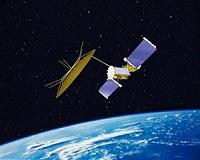 |
Geneva (AFP) July 13, 2010 The United States said Tuesday that a space arms control treaty was unlikely to emerge in the near future as it still sees flaws in drafts being tabled at the moment. "I don't see any near-term progress on a space arms control treaty, but again I think there is a lot of shared interest between the US, Russia, China and others on providing space stability," said Frank Rose, deputy assistant secretary of state at the Bureau of Verification, Compliance and Implementation. "There are a lot of near-term confidence building measures that we hope to work with Russia and China on," he told journalists after addressing the UN Conference on Disarmament. Russia and China had proposed a new treaty to ban the use of weapons in space in 2008, but the United States maintained that it is a "flawed document." Rose pointed out that one sticking point was that it does not ban land-based anti-satellite capabilities. "We do not believe anti-satellite capabilities are in anyone's interest, they are debris generating," said Rose. "We need to maintain a sustainable space environment, blowing up satellites is not consistent with that principle," he stressed. Addressing the Conference on Disarmament, Rose said that "with respect to negotiating a new space arms control agreement, we have not seen a space arms control agreement that meets the criteria ... on equitability and effective verifiability." His comment was criticised by Brazil's envoy who remarked that effective verifiability was "attainable with the means disposed by not only one country but by many countries." "So it's possible to have an agreement in the international community that would meet this criteria." In addition, the Brazilian noted that there are "clear imbalances between countries" in almost every field. So if the criteria of equitability were to be applied, "leading countries would never be able ot negotiate or be party to an agreement, and it's not the case, fortunately."
Share This Article With Planet Earth
Related Links Military Space News at SpaceWar.com
 Key Test For First Mobile User Objective System Satellite Completed
Key Test For First Mobile User Objective System Satellite CompletedSunnyvale CA (SPX) Jun 15, 2010 The U.S. Navy and Lockheed Martin have announced that they have successfully completed a significant test milestone for the first satellite in the Mobile User Objective System (MUOS) program. A next-generation narrowband tactical satellite communications system, MUOS will provide the warfighter with the latest mobile technology such as simultaneous voice, video and data, as well as improve ... read more |
|
| The content herein, unless otherwise known to be public domain, are Copyright 1995-2010 - SpaceDaily. AFP and UPI Wire Stories are copyright Agence France-Presse and United Press International. ESA Portal Reports are copyright European Space Agency. All NASA sourced material is public domain. Additional copyrights may apply in whole or part to other bona fide parties. Advertising does not imply endorsement,agreement or approval of any opinions, statements or information provided by SpaceDaily on any Web page published or hosted by SpaceDaily. Privacy Statement |